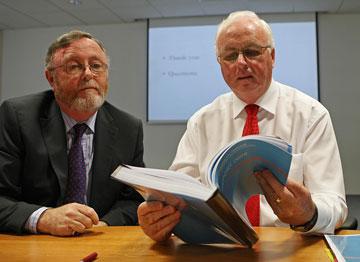Rank unfairness of tax plans is no surprise

Jean Baptiste Colbert was minister for finance during the regime of Louis XIV. He was credited with rescuing the French economy from bankruptcy in the middle of the 17th century. One of his successes was to extend the tax base beyond small landowners.
He offered the following advice on taxation policy: “The art of taxation consists in so plucking the goose as to obtain the largest amount of feathers with the least amount of hissing.” The quotation is displayed prominently in the museum of the Revenue Commissioners at Dublin Castle.
The report of the Commission on Taxation seems to have achieved the reverse with its goose: the least amount of feathers with the maximum amount of hissing. The report was supposed to be “revenue neutral” and a lot of the hissing arises from its failure to explain what tax deductions there will be to offset the tax increases proposed.
But the main cause for hissing is the rank and spectacular unfairness of what it proposes. This is hardly surprising given the composition of the commission and its terms of reference. Of the 18 members of the commission, 10 were financiers or tax consultants or accountants or members of a business lobby or the head of the stock exchange (the latter resigned during the course of the commission’s work, but surely she can claim credit for the extraordinary proposal to remove the 1 per cent stamp duty on share transactions). Only a single person, Brendan Hayes of the trade union Siptu, represented workers or the average taxpayer, and he refused to sign the report because of the iniquitous effects of its recommendations.
That the commission should be packed with professionals whose livelihoods were/are earned by helping rich people minimise their taxes guaranteed an outcome that was certain to be less than committed to the idea of a more equal society. Just as the McCarthy team on public expenditure cuts was badly constituted, and with the same outcome. I am not suggesting that the commission members were not people of integrity, rather that they, like the rest of us, are hugely influenced by their own personal interests and experiences. The same goes for the McCarthy group.
The terms of reference were also crucial to the outcome. The first of these set the tone of the report: “to keep the overall tax burden low”. Is it not the low tax regime created here since 1997 that got us into so much trouble and caused the deep inequalities that now characterise our society?
Nowhere in the terms of reference is there any acknowledgment of one of the central purposes of a taxation system: to readjust the unfair allocation of wealth and income caused by market forces. There is a mention of fairness in the tax system, but no mention at all of unfairness in society.
The contention that it was low taxes that drove the Celtic Tiger is just wrong. The economy was booming by 1997 and it was from then on that the tax base was eroded.
It is hardly surprising, then, that the commission would come out with a plethora of recommendations which, if implemented, would greatly deepen inequality: the property tax, water charges, the taxation of welfare benefits and the ending of tax breaks for childcare – all would have devastating effects on families living on average incomes.
True, there are proposals for the ending of tax breaks for wealthy people, but these are qualified: “We do not recommend any change to the existing effective tax rate of 20 per cent [for wealthy individuals]”. Isn’t it astonishing that while a large number of taxpayers pay tax at a rate higher than 20 per cent, the wealthiest are to get away with paying just 20 per cent? Why shouldn’t the wealthiest – people earning more than €250,000 – pay taxes at 40 per cent, as they do in most European countries? Even in America they pay far more than 20 per cent. In some of the most cohesive and successful societies, such as Denmark and Sweden – measured by mortality rates, health indices, crime rates, imprisonment rates – most people pay tax close to 60 per cent of their incomes. They also have very successful economies.
On page 54 of the report is a table showing distribution statistics on personal incomes prepared by the Revenue Commissioners. It relates to income assessed for the tax year 2006, which was processed up to mid-August 2008. It gives an insight into the scale of inequality here. The table refers to tax cases, not to individuals, for in many instances, for example, a husband and wife are treated as one “case”. It shows that the wealthiest 1.36 per cent (30,000 cases) get 13 per cent of all income and the lowest one-fifth get just 3 per cent of all income (this is based on an extrapolation of the data in the report).
Wouldn’t you think a commission on taxation would address how the tax system could be used to readjust these proportions? The top 0.4 per cent earned incomes at an average of €678,103.
The commission of accountants, tax advisers, stock exchange heads, tax solicitors et al weren’t interested. Any wonder?
